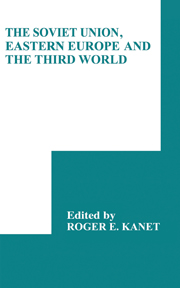Book contents
- Frontmatter
- Contents
- List of figures
- List of tables
- List of contributors
- Foreword by R.C. Elwood
- Preface by Roger E. Kanet
- PART 1 THE THIRD WORLD IN SOVIET FOREIGN POLICY
- 1 The Soviet Union and the Third World from Khrushchev to Gorbachev: the place of the Third World in evolving Soviet global strategy
- 2 Revolutionary change in the Third World: recent Soviet reassessments
- 3 Anti-Soviet insurgencies: growing trend or passing phase?
- 4 The Soviet Union and the New World Information Order
- 5 Soviet propaganda and the process of national liberation
- PART 2 CMEA ECONOMIC INVOLVEMENT IN THE THIRD WORLD
- PART 3 THE SOVIET UNION IN THE MIDDLE EAST AND SOUTH ASIA
- Index
- Publications from the Third World Congress for Soviet and East European Studies, Washington, 1985
2 - Revolutionary change in the Third World: recent Soviet reassessments
from PART 1 - THE THIRD WORLD IN SOVIET FOREIGN POLICY
Published online by Cambridge University Press: 06 July 2010
- Frontmatter
- Contents
- List of figures
- List of tables
- List of contributors
- Foreword by R.C. Elwood
- Preface by Roger E. Kanet
- PART 1 THE THIRD WORLD IN SOVIET FOREIGN POLICY
- 1 The Soviet Union and the Third World from Khrushchev to Gorbachev: the place of the Third World in evolving Soviet global strategy
- 2 Revolutionary change in the Third World: recent Soviet reassessments
- 3 Anti-Soviet insurgencies: growing trend or passing phase?
- 4 The Soviet Union and the New World Information Order
- 5 Soviet propaganda and the process of national liberation
- PART 2 CMEA ECONOMIC INVOLVEMENT IN THE THIRD WORLD
- PART 3 THE SOVIET UNION IN THE MIDDLE EAST AND SOUTH ASIA
- Index
- Publications from the Third World Congress for Soviet and East European Studies, Washington, 1985
Summary
An increasingly sober and far-ranging review of the nature of Third World radicalism and its relationship to scientific socialism marks a significant change in Soviet perceptions about the USSR's ability to manipulate anti-imperialism to its advantage. Dating from about 1980, this re-examination is related to Moscow's difficulties in imposing a Marxist regime in Afghanistan, the unexpected turn of the Iranian revolution from an anti-American upheaval into Islamic fundamentalism, and the mounting concern for the performance of the Soviet economy.
Official statements give only partial and conflicting evidence of an altered outlook. In the past three years, for example, the May Day slogans, which reaffirm the regime's domestic and foreign policy objectives, have given up many ritualistic claims about revolutionary change in the Third World. They no longer single out the radical states that have chosen the path of socialist orientation; the adjective “invincible” has been dropped from the reference to the Soviet Union's alliance with the national liberation movements; and the “struggle against imperialism” is not mentioned as the goal of international solidarity. Yet, these claims have not disappeared altogether from other pronouncements.
To get a better sense of the on-going reassessment one must turn to the writings of Soviet experts on the Third World. Many of them are prominent in academic and Party institutions that help formulate foreign policy. Among these people the change of mood is unmistakable.
- Type
- Chapter
- Information
- The Soviet Union, Eastern Europe and the Third World , pp. 23 - 41Publisher: Cambridge University PressPrint publication year: 1988

